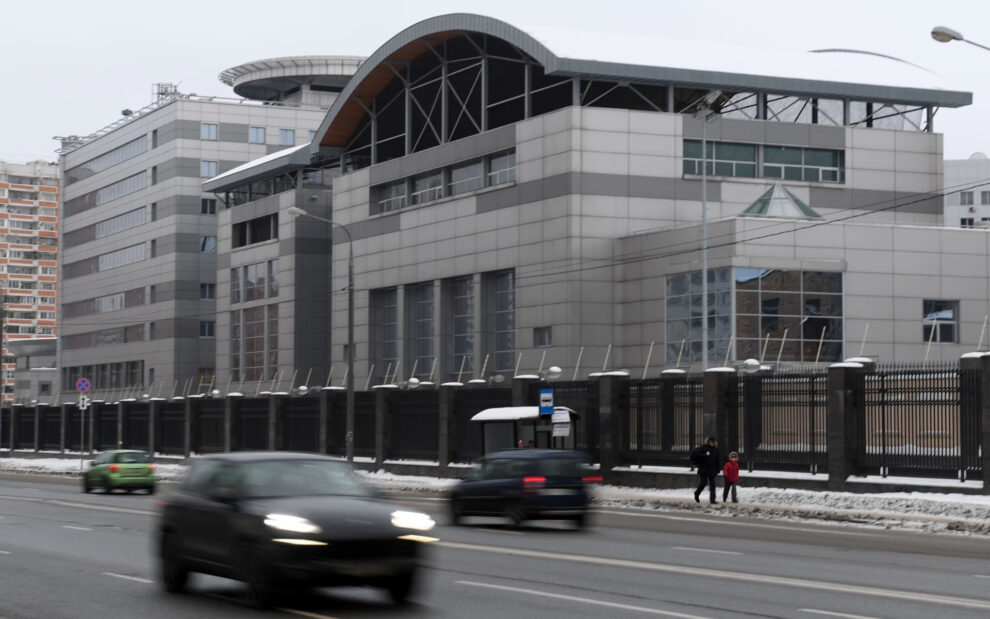The operations of Moscow’s Department of Special Tasks have included attempted killings, sabotage and a plot to put incendiary devices on planes
Russia’s spy services have a shadowy new unit taking aim at the West with covert attacks across Europe and elsewhere, Western intelligence officials say.
Known as the Department of Special Tasks, it is based in the Russian military-intelligence headquarters, a sprawling glass-and-steel complex on the outskirts of Moscow known as the aquarium. Its operations, which haven’t been previously reported, have included attempted killings, sabotage and a plot to put incendiary devices on planes.
The department’s creation reflects Moscow’s wartime footing against the West, the officials said. It was set up in 2023 in response to Western support for Ukraine and includes veterans of some of Russia’s most daring clandestine operations in recent years, according to two European intelligence chiefs and other U.S., European and Russian security officials.
The Kremlin sees the West as complicit in Ukraine’s attacks on Russia such as the sabotage of the Nord Stream pipelines, the killings of senior officials in Moscow, and Ukrainian strikes using long-range Western missiles, according to these officials. Ukraine has denied it was behind the sabotage of the Nord Stream pipelines.
“Russia believes it is in conflict with what it calls ‘the collective West,’ and is acting accordingly, up to and including threatening us with nuclear attack and building up its military,” said James Appathurai, deputy assistant secretary-general of the North Atlantic Treaty Organization in charge of hybrid warfare.
“These are, as usual, completely unsubstantiated accusations,” said Kremlin spokesman Dmitry Peskov.
The new department, which is known to Western intelligence officials by its Russian acronym SSD, is believed to be behind a host of recent attacks against the West, including the attempted killing of the chief executive of a German arms maker and a plot to put incendiary devices on planes used by shipping giant DHL.
The SSD has brought together various elements of Russia’s intelligence services. It has taken over some powers from the FSB, the country’s largest intelligence service, and absorbed Unit 29155, which Western intelligence and law-enforcement officials say was behind the 2018 poisoning of a Russian double agent, Sergei Skripal, in the U.K.
The SSD has at least three broad tasks, according to Western intelligence officials: carrying out killings and sabotage overseas, infiltrating Western companies and universities, and recruiting and training foreign agents. The department has been seeking to recruit agents from Ukraine, developing nations and countries seen as friendly to Russia, such as Serbia. The department also runs an elite special operations center, known as Senezh, where Russia trains some of its special forces.

Lt. Gen. Ivan Kasianenko, left, and Col. Gen. Andrey Averyanov. The two men run the operations of the SSD.Russian authorities, Sergei Bobylev/TASS/ZUMA Press
Two men—Col. Gen. Andrey Vladimirovich Averyanov and his deputy, Lt. Gen. Ivan Sergeevich Kasianenko—oversee the operations of the SSD. Averyanov, a veteran of Russia’s Chechen wars, is wanted by Czech police for his suspected role in an operation to blow up an ammunition depot in 2014, an attack that killed two people. President Vladimir Putin awarded him Russia’s highest honor, the Hero of Russia medal, following his involvement in the occupation and annexation of Crimea.
Western intelligence officials said they believe his deputy, Kasianenko, coordinated the operation to poison Skripal and his daughter, Yulia, in the U.K. Both survived the poisoning but were critically injured. A third woman died after picking up a perfume bottle contaminated with the poison that the attackers had discarded. Russia denied involvement in the poisoning.
Kasianenko’s role includes overseeing covert operations in Europe and the takeover of the Wagner paramilitary operations in Africa after the killing of its founder, Yevgeny Prigozhin, in 2023. Details of Kasianenko’s role haven’t been previously reported.
Kasianenko was born in 1975 in Kazakhstan, then part of the Soviet Union. Known internally by his initials KIS, he joined Russia’s military intelligence, known as the GRU, after serving in Russia’s air force.
A Persian speaker who once operated in Tehran under the guise of a diplomatic posting, Kasianenko was recently involved in facilitating a transfer of skills and technology from Russia to Iran, according to European intelligence officials. Tehran provides drones and missiles for Moscow’s war in Ukraine.
Kasianenko was earlier identified by Christo Grozev, an investigative journalist, in a report for the online news outlet the Insider. Grozev said he originally identified GRU operatives from a scene in a recent documentary about the Taliban’s rule in Afghanistan, “Hollywoodgate.” He was then able to obtain phone records of one of the operatives, which showed that he had been interacting with Kasianenko.
In December, the European Union sanctioned a unit of the department, without identifying the SSD by name, for orchestrating “coups, assassinations, bombings, and cyberattacks” in Europe and elsewhere. The U.S. indicted members of the SSD on similar charges in December. The State Department is offering a reward of up to $10 million for any information about five members accused of cyberattacks on Ukraine.
Hostile activities by the SSD peaked last summer, but have subsided recently, according to U.S. and European officials. The lull in activity could be aimed at creating diplomatic space for Moscow to negotiate with the new U.S. administration, according to the two European intelligence chiefs.
In May, Ukraine’s security service said it had foiled a plot by Russia to set several supermarkets and a cafe on fire. Ukraine said the plan had been coordinated by Maj. Yuri Sizov.
Western intelligence officials said Sizov, who is an officer in Senezh, now part of the SSD, coordinated another operation days later to set a mall in the Polish capital of Warsaw ablaze. He has since been sanctioned by the EU for his role in the plots.
Then, in July, similar incendiary devices that were sent via DHL ignited in transit hubs in Leipzig, Germany, and Birmingham, England. If one of the devices had ignited while on a flight, it could have taken down the plane, the former head of Germany’s internal intelligence agency, Thomas Haldenwang, told lawmakers in October. That didn’t happen only because a connecting flight was late, and the device went off while at the airport, he said.
Security officials said the incendiary devices that ignited in July appeared to be part of a test run for putting similar devices on planes bound for North America. Warnings were quietly sent in August to major shipping companies, airlines and airports, and some of them enhanced security screenings, according to officials and industry representatives familiar with the procedures.
The details of the plot, which was discovered in late summer 2024, were first reported by The Wall Street Journal. The threat was assessed to be so high that the then national security adviser Jake Sullivan and Central Intelligence Agency chief William Burns called Russian leaders in August and asked them to stop the attack, according to U.S. and Russian officials. The calls were first reported by the New York Times.
Sullivan called Yuri Ushakov, an aide to Putin and a former ambassador to the U.S. Burns called his counterpart, Sergei Naryshkin, as well as Russia’s most senior security official, Sergei Shoigu, according to three people familiar with the conversations.
Both Shoigu and Ushakov, who are among a handful of officials with regular access to Putin, denied any knowledge of the DHL plot, these people said.
The SSD operates under broad orders from Putin, but the commanders might not seek approval for specific operations, Western and Russian officials said.
The department has been particularly focused on Germany because Russia sees the country as a weak link in NATO, due to its dependence on Russian energy, growing anxiety about nuclear escalation and sympathy for Russia among some politicians and voters, according to European, American and Russian intelligence officials.
In May last year, operatives from the SSD set fire to a factory in Berlin owned by Diehl, a company that supplies weapons systems to Ukraine, according to U.S. and European intelligence and security officials.
Around the same time, U.S. intelligence told Germany that it had uncovered a plan to assassinate leaders of Europe’s armaments industry, including Armin Papperger, the chief executive of Rheinmetall, the biggest supplier of artillery ammunition to Ukraine and which is also building a tank factory in the war-torn country.
There have been attacks elsewhere in Europe as well. In June, French authorities arrested a dual Ukrainian-Russian national after a makeshift bomb exploded in his hotel room. French authorities indicted him on terrorism-related charges, saying he had planned to bomb a home improvement store.
Some lawmakers and security officials have called for the West to step up covert efforts in response to Russia’s operations.
The U.S. should enhance and leverage its own clandestine activities, including in and around Russia, to deter further aggression from the Kremlin, said Nick Thompson, a former CIA paramilitary officer.
That was echoed by Sen. Tom Cotton (R., Ark.), the chairman of the Senate Intelligence Committee, who said in a recent hearing that the CIA “needs to become bolder and more innovative in covert action.”
Appathurai, the NATO official, warned that the U.S. and its allies needed to adopt a wartime mindset “across society” in response. Failing to do so in the face of growing Russian aggression would be dangerous, he said.






























